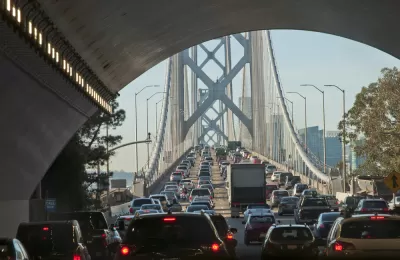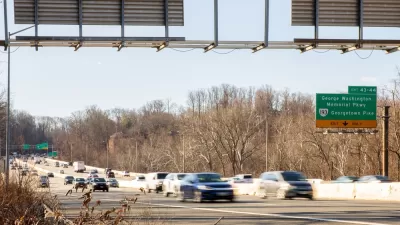Joe Cortright argues for a new approach to the discussion about the country's dependence on automobiles: talk about responsibility, not morals.

Joe Cortight suggests that there is a problem with the framework by which transit boosters, cyclists, planners, environmentalists, and safety advocates talk about cars:
…the problem is not that cars (or the people who drive them) are evil, but that we use them too much, and in dangerous ways. And that’s because we’ve put in place incentives and infrastructure that encourage, or even require, us to do so.
Faced with the question of how to reduce the negative impacts of driving, by reducing driving, the advocates listed above are locked in a political battle that is often contentious.
"Bitter and acrimonious flamewars between people who are convinced that one side or the other is trying to run us off the road will surely be unproductive," writes Cortright. Thus, he suggests a new way to argue in favor of reforms:
This isn’t about creating a “disincentive for car use,” but, as a matter of fairness and practicality, dropping what have essentially been subsidies for financially and socially expensive and dangerous behavior.
FULL STORY: Let’s not demonize driving—just stop subsidizing it

Alabama: Trump Terminates Settlements for Black Communities Harmed By Raw Sewage
Trump deemed the landmark civil rights agreement “illegal DEI and environmental justice policy.”

Study: Maui’s Plan to Convert Vacation Rentals to Long-Term Housing Could Cause Nearly $1 Billion Economic Loss
The plan would reduce visitor accommodation by 25% resulting in 1,900 jobs lost.

Planetizen Federal Action Tracker
A weekly monitor of how Trump’s orders and actions are impacting planners and planning in America.

Grand Rapids Mayor Proposes Garage Conversion Plan
The mayor says allowing homeowners to convert garages to dwelling units could alleviate the city’s housing shortage.

Baltimore Ordered to Improve Sidewalk Accessibility
The city is one of many to face lawsuits for failing to comply with the Americans with Disabilities Act.

This Toronto Suburb Has More Bus Riders Than Columbus, Ohio
Brampton, Ontario used gradual improvements in service to prove that if you build it, they will ride.
Urban Design for Planners 1: Software Tools
This six-course series explores essential urban design concepts using open source software and equips planners with the tools they need to participate fully in the urban design process.
Planning for Universal Design
Learn the tools for implementing Universal Design in planning regulations.
Smith Gee Studio
Alamo Area Metropolitan Planning Organization
City of Santa Clarita
Institute for Housing and Urban Development Studies (IHS)
City of Grandview
Harvard GSD Executive Education
Toledo-Lucas County Plan Commissions
Salt Lake City
NYU Wagner Graduate School of Public Service





























